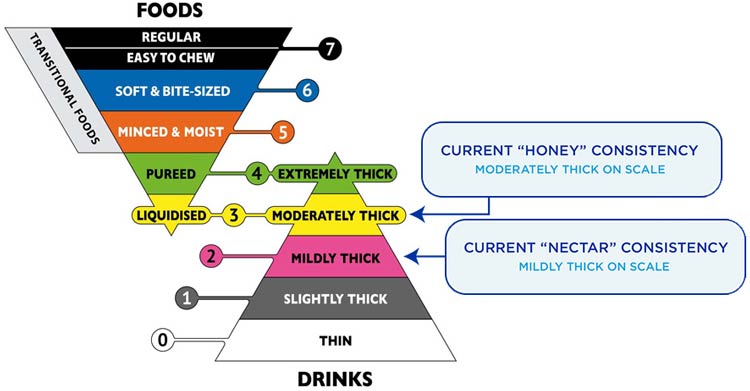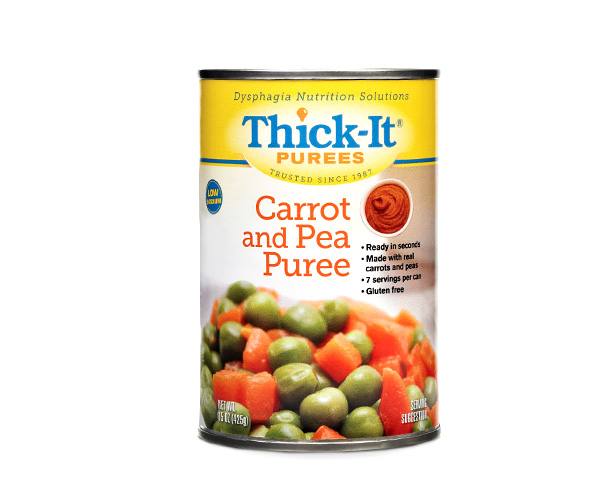
Please choose a body region on the right for you to pin point the problem area of your body.

Shop by Condition

Shop by Brand
Dysphagia is a condition in which individuals have difficulty chewing and/or difficulty swallowing food. In some cases, dysphagia may lead to pain when swallowing. The two types of dysphagia are oropharyngeal and esophageal dysphagia. Oropharyngeal dysphagia is related to problems in the mouth or pharynx, inhibiting the person’s ability to initiate a swallow. Esophageal dysphagia is a condition where people can swallow but there are problems when food passes through the esophagus. This can lead to a feeling or experience of food stuck in the throat.
 While dysphagia is a challenging condition, it can be managed through diet modifications. Difficulty swallowing can not only be troublesome and embarrassing but can also lead to malnutrition if patients are not taking in the necessary nutrients or avoiding eating. Other conditions that could result from dysphagia include dehydration and aspiration pneumonia.
While dysphagia is a challenging condition, it can be managed through diet modifications. Difficulty swallowing can not only be troublesome and embarrassing but can also lead to malnutrition if patients are not taking in the necessary nutrients or avoiding eating. Other conditions that could result from dysphagia include dehydration and aspiration pneumonia.
Some patients may be better able to manage their dysphagia with a dysphagia diet. The National Dysphagia Diet (NDD) guidelines offer several dysphagia diet levels based on the degree to which a patient’s dysphagia has progressed. Every patient will have a different degree of dietary modifications based on their swallowing capacity. This must be regulated by a healthcare professional such as a nurse of physician.
Mechanically altered diets and dietary modifications are crucial for dysphagia management. Some modified liquids may also be beneficial for individuals with dysphagia to help thicken fluids. CWI Medical has several thickening powders and thickening gels for liquids that are easy-to-use. It is important to keep in mind that thickeners may negatively affect the flavor and/or texture of drinks, making them less appealing and appetizing to patients.
Managing dysphagia through diet modifications requires education and knowledge. Understanding that some consistencies are less safe than others is crucial. Additionally, learning about different food textures (i.e., noncohesive, foods that easily separate, sticky foods, etc.) may be harmful for individuals with trouble swallowing. Thickening agents can be helpful, but every thickening agent is different. People with difficulty swallowing should not operate in a one-size-fits-all mentality with regard to thickening agents, as thicker is not always better for those who have trouble swallowing.
The NDD offers ongoing training for dysphagia treatment and management. Dysphagia management through the NDD includes how liquids should be thickened, how to increase calorie intake by patients with dysphagia, modifying acceptance of foods, and more.
There are several ways to improve the quality of life for people who have dysphagia. Becoming well-informed about how to manage dysphagia; understanding if you or a loved one has grade 2 dysphagia, grade 3 dysphagia, or another type of dysphagia; and making changes so that there is less pain when swallowing and discomfort when swallowing can all be instrumental in helping those who have trouble swallowing.
| |
|---|
 SimplyThick Thickening Gel |
 Thick & Easy Coffee Powder Packets, Decaffeinated |
| |
|---|
 Ensure Original Drink, Recloseable |
 Gelatein Plus High Protein & Calorie Gelatin Dessert |
 Thick-It Purees, Peas and Carrots, Case |
| Stay Connected! | |
|
|
|
Related Articles
Get $10 off your next order when you sign up to receive our email newsletter.*
Simply enter your email address below!
*Minimum order value of $100. Valid email address to qualify.







